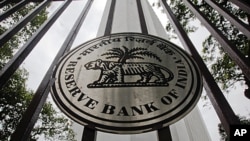India’s central bank has announced another interest rate hike in a bid to rein in inflation which continues to run high despite a series of rate hikes in the last year and a half.
The measure is widely expected to cool off the economy, which is already showing signs of slowing down.
Dramatic hike
Although the Reserve Bank’s move in hiking interest rates was widely anticipated, the half a percentage point raise caught economists by surprise. They had been expecting a more moderate increase.
The Reserve Bank will now lend to banks at eight percent. Reserve Bank Governor Duvvuri Subbarao says with inflation running at more than nine percent, he has no other options.
“Inflation is expected to remain elevated for a few more months before moderating towards the later part of this year," says Subbarao. "The challenge for the government and for the Reserve Bank is to ensure that demand is constrained in the short term to bring inflation down.”
The surge in inflation was triggered by high food prices, which have jumped more than 10 percent in the last year and are hurting millions of poor people in the country. Hikes in fuel prices have led to a further spike in inflation.
This is the 11th time that the Reserve Bank has raised interest rates since March of last year. The successive hikes have already begun dampening an economy which had been growing briskly at eight-and-a-half percent. However, the bank says there is no evidence of a sharp slowdown and expects growth to stay at eight percent.
Flagging optimism
That optimism is not shared by most economists, who say that Asia’s second fastest growing economy is losing momentum as credit becomes more expensive.
Car sales have slowed down. Consumers are taking fewer loans to buy homes. Investment has become sluggish, and industrial output has been down.
The government faces a dilemma. It has frequently said that India needs ten percent growth in the coming years to create new jobs and lift millions out of poverty, and had hoped to achieve that soon. But controlling inflation is also a priority as high prices are hurting the poor the most.
Economist D.H. Pai Panandiker, who heads the RPG Goenka Foundation, says the government will have to take steps to ensure that investment by industry does not dry up if it wants to ensure that growth does not take a significant hit.
“If you look at the impact of the earlier hike[s], the last six months or so, private investment has already come down by 43 percent," Panandiker says. "Increase in interest rates will bring it down further. Government has to think of other ways to bring up investment.”
Most observers had expected Tuesday’s interest rate hike to be the last announced by the Reserve Bank. But officials have warned that if inflation does not taper off, interest rates could be raised even further.
India has the highest inflation in a major Asian economy.




